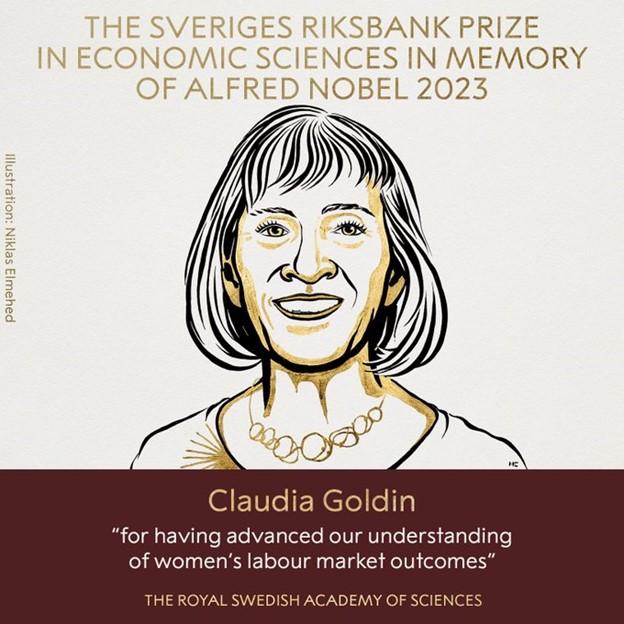
Closing Your Own Workplace Gender Gap means learning how to navigate as well as negotiate
Something remarkable happened in Stockholm today. The Nobel committee awarded the prize in Economics to a woman. Harvard University professor Claudia Goldin is one of only three female recipients out of 93 Economics laureates to date. As if winning this top honour wasn’t enough, Goldin’s award-winning research focused on understanding the perpetual gender gap in the labor market.
Studying 200 years of women’s participation in the workplace, Goldin found that despite continued economic growth (We’ve come a long way, Baby), women’s pay has never matched that of men’s. That divide still exists today, despite women gaining higher levels than men of education–a recognized factor in lifetime career earnings.
While Goldin does not offer solutions, her research allows policymakers to tackle the entrenched problem–if and when they do so. In the meantime, what can you do to close whatever gender gaps you are experiencing? We recommend a two-pronged strategy: Navigate and Negotiate.
Navigating the Workplace Means Bulidng a Solid Base
In Seven Habits of Highly Effective People, Stephen Covey writes about the series of concentric circles which inscribe our lives. Surrounding us at the center is our Circle of Control, those things we have the power to affect directly. The next level out is a Circle of Influence comprising things we may be able to impact even if they are outside of our direct control. Finally, there’s the Circle of Concern, which contains all the things we care about, from personal concerns to global issues.
To be effective in navigating organizational life, we advise focusing on your Circles of Influence. You know what’s in your control and what’s way outside it; the middle is where you have leverage, as you can expand that circle via adept navigation. Here’s what Covey suggests:
- Be proactive and affect change by focusing your energy on what you can/may be able to accomplish. That means being “response-able,” taking responsibility for your life v. blaming someone or something else. You may have been dealt a crappy hand when it comes to factors like genetics, circumstances, conditions or conditioning. But choose your actions based on your goals and don’t let what you can’t do get in the way of what you can.
- If actions speak louder than words, let your actions convey the confidence that comes from competence. Know what you’re good at and learn how to talk about yourself–that’s not bragging, that’s helping people understand what, where and how you can contribute. Don’t stop there; work on things you can do something about. Do your best and leave the rest.
- Watch your language. What you choose to say and how we choose to say it is within your control. Remember that language is a good indicator of how we see and value ourselves. Use proactive language: I can, I will, I prefer.
- Instead of reacting to or worrying about conditions over which you have little or no control, focus your energies, efforts and power for the greatest effect. There’s nothing sadder than potential unfulfilled when we don’t concentrate sufficiently. Covey writes, “At the very heart of our Circle of Influence is our ability to make and keep commitments and promises.”
- Within your Circle of Influence, build a Circle of Commitment that represents where you are intentionally putting time and energy, and will help you move from “I can” to “I will.”
Negotiating From a Position of Strength

Whether you are negotiating an internal promotion or a new opportunity, analyze your negotiating points before you start the process. It can be tempting to agree to an offer quickly as an indication of your interest in the position. This is especially true for women, many of whom have been conditioned to be pleasant, agreeable and grateful. What’s important to remember is that everything you do in your negotiations indicates how you will conduct business for the organization. Here are 10 Key Points:
- Your previous salary may have nothing to do with what you should be paid for a potential new job or what the company is prepared to pay you for it. Research compensation ranges for the type of work you plan to do.
- Your bargaining power is at its peak after the offer is made but before you accept. Once the company is convinced that you are The One, they will do whatever they can to make it happen.
- Knowing your “must have” bottom line is important; there’s no use taking a job/promotion that you can’t afford or will resent.
- If you consider your needs and wants well in advance, you won’t be tempted to accept an offer that doesn’t meet your requirements. Turing down an opportunity may sound like madness, particularly if you are unemployed or have no other offers, but it can be incredibly powerful, as it sends a strong message that you are not desperate.
- While salary is only one part of compensation, whatever base you accept will be the benchmark for all future compensation increases. Make sure you don’t hurt your long-term prospects by settling.
- In addition to salary, consider other factors like vacation, bonus, WFH flexibility, benefits and professional development support.
- Everyone can negotiate something, e.g., the start date or some unpaid vacation to attend a planned family event later in the year.
- Start with the assumption that everything is negotiable. It’s not, but you’ll find out soon enough where the “give” is and isn’t!
- Jobs are like relationships– you better be “in love” and satisfied with the terms and conditions going in because at some point the honeymoon will be over!
- Finally, you don’t ask, you don’t get.
In Goldin’s analysis, the roles of women workforce and the pay they receive are influenced by a number of factors: broad social and economic changes, her individual decisions about things like how much education to get, and “learning from the successes and failures of the preceding generation,” as Economist Randi Hjalmarsson, a member of the prize committee noted.
Paul Krugman, winner of the 2008 Nobel Prize in Economics opined that the choice of Goldin was “incredibly deserved,” noting that her research extended far beyond women in the labor market to include pioneering the empirical revolution in labor economics and important work on inequality that can and should influence future policy. Jakob Svensson, chair of the Nobel Committee for the Prize in Economic Sciences concurs:
“Understanding women’s role in the labor market is important for society. Thanks to Claudia Goldin’s groundbreaking research, we now know much more about the underlying factors and which barriers may need to be addressed in the future.”
As for Golden, she is gratified that her research “helps explain why change in labor market gender gaps has been so slow,” she said. She should know; when the prizes are handed out at awards ceremonies in December, Goldin will be nearly 78, but worth the wait: the prizes carry a cash award of 11 million Swedish kronor or about $1 million US dollars each. Thankfully, there’s no gender gap in the amount Goldin will receive.

Day Merrill, M.A., is the founding Partner and Career/Executive Coach for 2BDetermined. She is a 30-year career services professional with expertise coaching individuals and teams on a range of career and work-related topics as well as consulting to organizations in Canada and the U.S. on their workforce development needs. Day holds a B.A. from Connecticut College, a Master of Arts from Wesleyan University and has completed Coach U’s coach certification training.